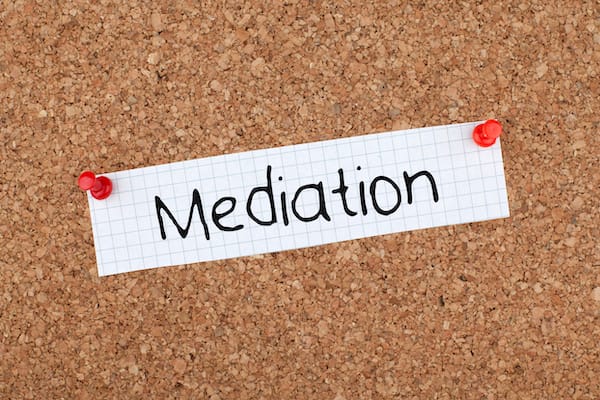A marriage ending is unfortunately not a rare occurrence in our society. There is no magic timeframe of when a divorce may or may not occur. No matter when a marriage ends, the fallout is significant. Spouses and families often struggle to adjust to their changed circumstances.
Traditional divorce litigation can pit spouses against each other, creating no-win situations. Court decisions can create situations where nobody is happy with the result. Court decisions can take years to obtain and there is the risk of an appeal. An appeal delays finality for more years. A mediated agreement between a divorcing couple cannot be appealed; finality is upon signing of the agreement.
Divorce mediation offers a better path to resolution and efficiently moving forward. Here’s what you need to know about this innovative and powerful divorce alternative.
WHAT IS DIVORCE MEDIATION?
Mediation is a tried-and-true form of conflict resolution. At its simplest, it involves individuals in conflict with one another working with a neutral third party to facilitate resolution. This third party helps the individuals work through their disagreements to reach a satisfactory outcome.
The mediator may:
- Help the parties communicate clearly;
- Offer information to inform the discussion;
- Suggest solutions neither party has thought of;
- Help keep discussions on track; and,
- Help the individuals negotiate a compromise for resolution.
Divorce Mediation vs. Litigation
In many ways, divorce mediation is the opposite of traditional divorce litigation. In litigation, spouses and their lawyers face off in front of a judge. Each side works from their individual position and in their own best interests. Unfortunately, the fighting can become ugly and drag on for years. At the end of the process, the judge issues a decision that impacts each party’s future. Couples have very little control in the final result and the court proceedings are part of the public record with no right to privacy. Mediation, by contrast, allows couples to maintain control over their situation. Mediation:- Is efficient and lasts as long as necessary to reach resolution;
- Is confidential;
- Is less expensive than a full trial;
- Is less adversarial than litigation;
- Is more likely to result in agreed upon terms that both parties are vested in as a result of having been in control of the decision-making process; and,
- Mediation can minimize the negative impact of divorce on everyone involved. It can also lead to healthy post-divorce communication and interaction.
Mediation and Lawyers
Divorce mediation does not have to involve lawyers. Spouses parting on good terms can work through the process solely with the help of a trained mediator. However, couples can involve lawyers in the process if they wish. This can work in two ways. First, couples may hire a mediator and then each hire their own lawyers. The spouses and their lawyers will then sit down with the mediator to negotiate terms. This can be appropriate when one or both spouses feel unable to advocate on their own behalf. Having a lawyer may ensure that their needs and concerns will be properly verbalized and addressed. This is important since the mediator is a neutral party. They will work to ensure that all sides are heard, but they cannot advocate specifically for one party over the other. The second option is to hire a divorce mediation attorney that is a certified mediator. In this situation, the mediator acts as a neutral for both parties who advocate for themselves during the process. There are several advantages to this:- The mediator understands divorce and family law and can provide guidance; The mediator can handle all steps of the divorce paperwork rather than handing it off to another professional for review and filing;
- The couple only has to pay one party (the mediator) rather than three (the mediator and two lawyers); and,
- Working with only one other party instead of three can save time in the process.
WHAT DOES A DIVORCE MEDIATOR DO FOR YOU?
Before asking “where can I find divorce mediation near me?” it is important to understand exactly what a divorce mediator does and does not do. Divorce mediators do:- Facilitate respectful, productive communication;
- Help you find solutions that work for everyone;
- Remain neutral, not taking sides;
- Draw up documents that reflect the terms you have agreed to with your spouse; and,
- Educate you on issues related to the decisions you need to make, such as what topics need to be covered in divorce paperwork.
- Provide legal, financial, or other specialized advice;
- Make decisions for you;
- Force either party to do or agree to anything;
- Represent or advocate for one spouse against another;or
- Provide counseling.
Training and Credentials
Mediators are not required to receive legal certification and licensing the way that lawyers or financial professionals are. As a result, many professionals in other fields may advertise themselves as mediators. This does not mean they are genuinely capable of helping you achieve a better divorce. Look for mediators who:- Have completed training on mediation;
- Are experienced mediators; and,
- Have been certified by the state as a divorce mediator.
- Special needs children;
- Business assets;
- A unique tax situation;
- Particularly high incomes;
HOW DOES DIVORCE MEDIATION WORK?
Divorce mediation begins with a separating couple deciding that they want to avoid the litigation process. Couples must agree that they are willing to work together to negotiate the terms of their divorce. The next step is deciding whether they need:- Just a mediator;
- A mediator who is also an attorney;
- A mediator and separate attorneys; and,
- Mediators or attorneys who specialize in specific circumstances.
Documentation
Once you have chosen a mediator, you and your spouse will need to gather a variety of documentation. This includes:- Income information, banking information, investment information, and tax statements;
- Insurance policies;
- Proof of ownership of assets, such as houses and vehicles; and,
- Documentation of relevant health conditions, particularly those of any children involved.
THE MEDIATION PROCESS
Typically, the mediation process begins with your mediator walking you through what to expect. They will:- Help you understand the full scope of topics to be discussed.
- Make sure you know your rights and responsibilities.
- Answer any questions you may have.
Filing for Divorce
When your agreement is complete, your mediator will draw up legal documents. If your mediator is also a lawyer, you can submit these documents to the court directly to receive an uncontested divorce. If your mediator is not an attorney, you will likely need the documents to be reviewed by an attorney separately.WHO IS A GOOD CANDIDATE FOR MEDIATION?
Couples can attempt mediation at any time during their divorce proceedings. You are most likely to be successful with mediation if:- You and your spouse agree that you are ready to get divorced;
- You want to maintain control over your divorce settlement as much as possible;
- You want to avoid court for privacy, financial, or other reasons;
- You are interested in non-traditional custody arrangements for your children;
- You trust your spouse to be honest about their assets and intentions; and/or,
- You want to lay the groundwork for positive post-divorce interactions between you and your spouse.
WHO IS NOT A GOOD CANDIDATE FOR MEDIATION?
Mediation is generally not appropriate for couples when:- One party is physically or mentally incapacitated and unable to negotiate;
- Domestic violence is involved;
- Your spouse does not want to divorce or is not willing to participate in mediation; and/or,
- You do not trust your spouse to be honest about their assets or intentions.
COST OF MEDIATION VS DIVORCE
Divorce mediation services are significantly cheaper than traditional litigation. Litigating a divorce can begin at a cost of $15,000 and higher. In fiercely contested cases, expenses can continue to increase without a maximum known financial cost. Your exact mediation costs will vary depending on how much conflict there is between you and your spouse and any special circumstances you have. Divorce mediation is less costly and will be financially efficient.HOW TO GET STARTED WITH MEDIATION
If you believe that divorce mediation services may be right for you, there are several things you can do right now to get started. These include talking to your spouse, thinking about your priorities, and gathering documentation. Talk to Your Spouse First, you should talk to your spouse. Explain divorce mediation to them and give them a chance to research and consider it. Do not pressure them to participate, but discuss whether they also think mediation might be a good fit. Think About Your Priorities Mediation will require you to be able to explain your priorities, concerns, and hopes for your post-divorce life. If you cannot, then your mediator may have a hard time helping you achieve outcomes that meet your future goals. Spend some time thinking, researching, and making notes about what you expect and what is important to you. If possible, do some math and come up with actual numbers or other hard facts to support and round out your expectations. This will equip you to communicate clearly with your spouse and your mediator and can shorten the amount of time it takes to complete the process. Documentation Collecting the documentation you need for the mediation process can be time-consuming. Starting early can help. Begin collecting:- Proof of identification for yourself, your spouse, and your children;
- Proof of your marriage and any prenuptial arrangements you have;
- Proof of employment, income, and assets including your home and vehicles;
- Proof of shared or personal debt or liabilities;
- Information on retirement plans and insurance policies;
- Proof and assessments of valuable personal items or collectibles;
- Information on business assets;
- Copies of at least three years of tax returns; and,
- Health or school records for your children, if relevant.




